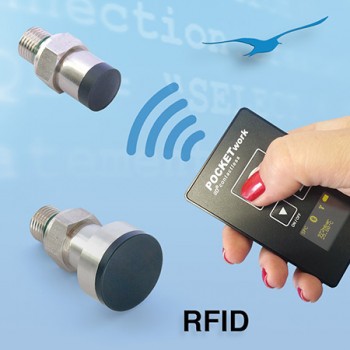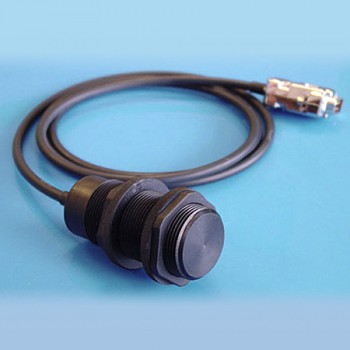KELLER unplugged Series 21 D RFID and 21 DC RFID

Series 21 D RFID & 21 DC RFID
Photo by KELLER AG
As one of the first manufacturers anywhere in the world to recognise the potential offered by combining near-field communication with industrial pressure transmitters, KELLER AG für Druckmesstechnik has now launched two new series: the 21 D RFID and the 21 DC RFID. The passive pressure transponders in the Series 21 D RFID are autonomous in terms of their energy requirements, allowing them to be used indefinitely without maintenance, while the main attraction of the Series 21 DC RFID is its integrated data logger, which runs on a special long-life battery. With both products, the energy required to transmit measurements is provided wirelessly via the RFID interface. Potential applications for these hermetically sealed pressure transponders include mobile systems, large-scale facilities and as replacements for conventional pressure gauges with dials.
Take readings easily from inconspicuous measurement points
The pressure transponders in the Series 21 D(C) RFID are based on KELLER’s Series 7 LD pressure transmitters, which are extremely sturdy with excellent long-term stability. The sophisticated transponder technology is the work of the RFID specialists at microsensys GmbH. A moulded RFID transponder made from impact-resistant plastic replaces the usual plug for electrical connections, with stainless steel being used for all parts that come into contact with media. The pressure transponders in the Series 21 D(C) are thus immune to environmental influences and vandalism. An RFID reader allows measurements to be read off quickly and easily and transferred straight to a laptop via USB. Alternatively, a battery-operated pocket reader can be used, which displays measurements, stores them to its memory and makes them available as an .xml file for transfer via USB.
Series 21 DC RFID with integrated data logger
As well as the benefits of the Series 21 D, the pressure transponders in the Series 21 DC (DataCollector) also come with an integrated data logger, while a special integrated battery with a life of up to ten years guarantees a reliable power supply. The data logger records pressure and temperature values at intervals of between 10 seconds and 255 minutes. Depending on how it is configured, the measurement function will either stop when the memory is full (2’048 measurements), overwrite existing data (ring mode) or go into sleep mode. As with the pressure transponder, measurements are configured and read off using RFID, preserving battery life.
Typical applications for RFID pressure transponders

M30 with a threaded end and USB or RS232 interface
Photo by KELLER AG
KELLER’s RFID pressure transponders are ideal for use wherever vibrations, moisture, dirt or icy conditions make mechanical pressure gauges unsuitable. Unlike with manual data logging, reading errors and mix-ups can be avoided thanks to wireless transmission and freely configurable measurement points. RFID pressure transponders are particularly advantageous when it comes to monitoring large-scale pressurised facilities such as chemical plants, chillers or large building complexes. Closely related applications include the occasional monitoring of pressure vessels and the inspection of pressure-resistant components, e.g. as part of incoming goods checks. The sturdy, compact and inconspicuous design of the two Series 21 D(C) RFID lets hydraulic pressure be monitored on excavator shovels and clamping chucks. KELLER AG für Druckmesstechnik and microsensys firmly believe that the market launch of the RFID pressure transponders in stainless steel housings suitable for industrial use will open up many more potential areas of application. This will enable monitoring, quality management and process design and safety systems to benefit from traceable pressure and temperature data.
Ideal for on-the-spot measurements on engine test benches and in wind tunnels
Eight pressure measuring ranges from 3 to 1’000 bar are available for measuring absolute pressure. The overall error range is set at ±0,7 %FS at industry-standard operating temperatures of -10…80 °C, while a temperature sensor also allows the temperature of the medium to be monitored.
News Categories
- » NEWS HOME
- » Automation & Robotics
- » Industry 4.0
- » Material Handling
- » Sensors
- » Quality & Testing
- » Machine Vision
- » Laser & Optics
- » Metalworking
- » Motion Control & Drives
- » Hydraulics & Pneumatics
- » Process Industry
- » Renewable Energy
- » Agriculture
- » Home & Office Furniture
- » Environmental Tech

